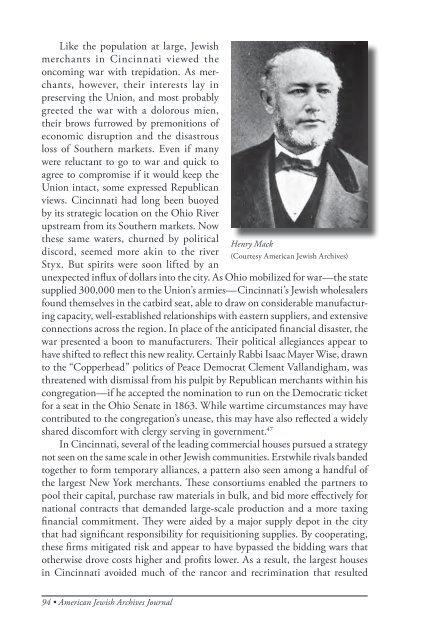American Jewish Archives Journal, Volume 64, Numbers 1 & 2
American Jewish Archives Journal, Volume 64, Numbers 1 & 2
American Jewish Archives Journal, Volume 64, Numbers 1 & 2
You also want an ePaper? Increase the reach of your titles
YUMPU automatically turns print PDFs into web optimized ePapers that Google loves.
Like the population at large, <strong>Jewish</strong><br />
merchants in Cincinnati viewed the<br />
oncoming war with trepidation. As merchants,<br />
however, their interests lay in<br />
preserving the Union, and most probably<br />
greeted the war with a dolorous mien,<br />
their brows furrowed by premonitions of<br />
economic disruption and the disastrous<br />
loss of Southern markets. Even if many<br />
were reluctant to go to war and quick to<br />
agree to compromise if it would keep the<br />
Union intact, some expressed Republican<br />
views. Cincinnati had long been buoyed<br />
by its strategic location on the Ohio River<br />
upstream from its Southern markets. Now<br />
these same waters, churned by political<br />
discord, seemed more akin to the river<br />
Styx. But spirits were soon lifted by an<br />
unexpected influx of dollars into the city. As Ohio mobilized for war—the state<br />
supplied 300,000 men to the Union’s armies—Cincinnati’s <strong>Jewish</strong> wholesalers<br />
found themselves in the catbird seat, able to draw on considerable manufacturing<br />
capacity, well-established relationships with eastern suppliers, and extensive<br />
connections across the region. In place of the anticipated financial disaster, the<br />
war presented a boon to manufacturers. Their political allegiances appear to<br />
have shifted to reflect this new reality. Certainly Rabbi Isaac Mayer Wise, drawn<br />
to the “Copperhead” politics of Peace Democrat Clement Vallandigham, was<br />
threatened with dismissal from his pulpit by Republican merchants within his<br />
congregation—if he accepted the nomination to run on the Democratic ticket<br />
for a seat in the Ohio Senate in 1863. While wartime circumstances may have<br />
contributed to the congregation’s unease, this may have also reflected a widely<br />
shared discomfort with clergy serving in government. 47<br />
Henry Mack<br />
(Courtesy <strong>American</strong> <strong>Jewish</strong> <strong>Archives</strong>)<br />
In Cincinnati, several of the leading commercial houses pursued a strategy<br />
not seen on the same scale in other <strong>Jewish</strong> communities. Erstwhile rivals banded<br />
together to form temporary alliances, a pattern also seen among a handful of<br />
the largest New York merchants. These consortiums enabled the partners to<br />
pool their capital, purchase raw materials in bulk, and bid more effectively for<br />
national contracts that demanded large-scale production and a more taxing<br />
financial commitment. They were aided by a major supply depot in the city<br />
that had significant responsibility for requisitioning supplies. By cooperating,<br />
these firms mitigated risk and appear to have bypassed the bidding wars that<br />
otherwise drove costs higher and profits lower. As a result, the largest houses<br />
in Cincinnati avoided much of the rancor and recrimination that resulted<br />
94 • <strong>American</strong> <strong>Jewish</strong> <strong>Archives</strong> <strong>Journal</strong>
















